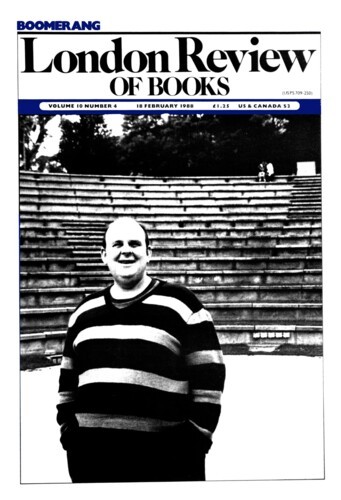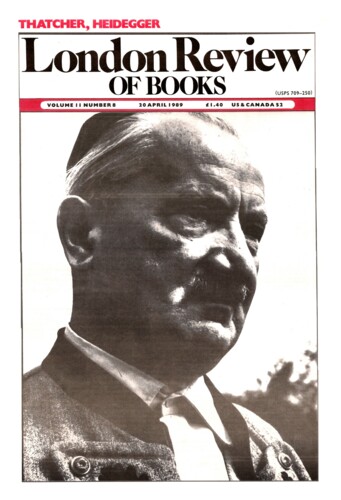Sylvia Lawson
Sylvia Lawson is the author of How Simone de Beauvoir Died in Australia.
Boomerang
Sylvia Lawson, 18 February 1988
Australia, n. A country lying in the South Sea, whose industrial and commercial development has been unspeakably retarded by an unfortunate dispute among geographers as to whether it is a continent or an island.
Ambrose Bierce, The Devil’s Dictionary
Stalemate beneath the dense sky of moratorium agreements: the best we can hope for Europe ... But there is no escape route in sight. You feel...
Cheer up, Clive
18 February 1988
Intelligencer
Sylvia Lawson, 24 November 1988
The book’s title mocks the author’s own position. It comes from a newspaper column of 1985 in which he attacked what he saw as ‘the retreat from politics’ into nihilistic spectatorship, and thus passivity. ‘Games with shadows and changing reflections threaten the citizen’s most elementary weapon of self-defence: memory.’ Acutely and characteristically, he links passivity to unemployment, and the argument moves off from the dubious ‘politics of spectacle’ into the world Ascherson so insistently dissects, the one in which most people are without power, where social participation is not a right but a privilege. But then, by using the phrase as title, he implicitly turns part of the attack on himself and his kind. This isn’t self-deprecation, rather a stubborn stoicism which seems to mean: take it or leave it, this is all I can do. It asks us to think about the apparent political impotence of mere writers and readers; if writing and reading are all we can do, we must either gamble on their validity or surrender.
Greeromania
Sylvia Lawson, 20 April 1989
Fervently hoping to be proved wrong, I think this marvellous book is all too likely to be denied the reception and the uses it deserves. Two things especially stand in its way: the celebrity status of the author, and the apparent transparency of her style, which might easily deceive you into believing the work a far less literary object than it is. And there are baying voices along its path; most current feminist writing is either highly academic and philosophically separatist, or else purplish commercial-confessional; on both registers, this specimen of personal history is decisively at odds, open, generous, crazily compendious as it is. There is another danger; I shall come to it later.
Pieces about Sylvia Lawson in the LRB
Bullshit and Beyond
Clive James, 18 February 1988
In its short history, Australia has weathered several storms. By world standards they were minor, but at home they loomed large. The First World War was a rude awakening; the Great Depression hit...
Read anywhere with the London Review of Books app, available now from the App Store for Apple devices, Google Play for Android devices and Amazon for your Kindle Fire.
Sign up to our newsletter
For highlights from the latest issue, our archive and the blog, as well as news, events and exclusive promotions.



